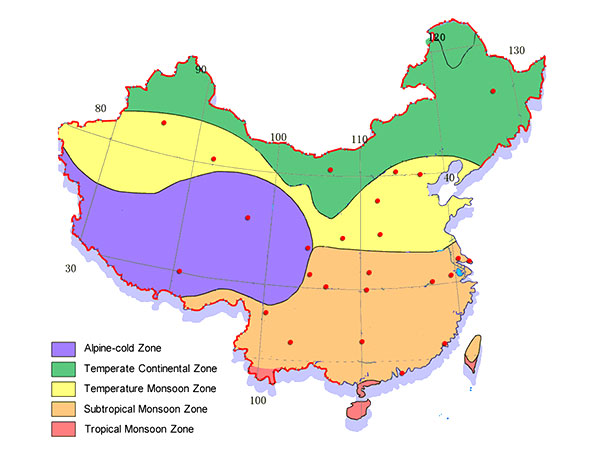7 Lesson 11 Dialogue 1: 周末去露营
Dialogue:
(张平给王红打电话。)
张平:喂,王红,明天和后天是周末,我想约你出去玩儿,你有空吗?
王红:好啊。去哪儿?玩儿什么?
张平:我们去露营,怎么样?
王红:太好了。不过不知道明后天的天气会怎么样?
张平:你现在方便用电脑或者手机上网吗?你查一下天气预报,好吗?
王红:好啊。你等一下。…网上的天气预报说明天上午是晴天,最高气温摄氏23度,很暖和。中午晴转多云。下午多云转阴。
张平:晚上呢?
王红:晚上会下雨,有点儿冷,最低气温摄氏9°。
张平:那后天的天气怎么样?
王红:后天的白天比明天的暖和一点儿,可是后天晚上的天气比明天晚上的还糟糕。
张平:怎么糟糕?
王红:后天晚上要下大雨。张平,下大雨怎么露营?我们怎么办?
张平:我们明天去露营,后天下午就回来,你觉得怎么样?
王红:好。要不要带雨伞?
张平:不用带。你准备吃的,我去准备帐篷。
Vocabulary:
| 中文 | 拼音 | 英文 |
|---|---|---|
| 约 | yuē | v., to date, to invite, to schedule a time |
| 出去 | chū qù | v., to go out |
| 露营 | lù yíng | v., to go camping |
| 天气 | tiān qì | n., weather |
| 查 | chá | v., to look up, to examine |
| 预报 | yù bào | v./n., to forecast; forecast |
| 晴天 | qíng tiān | n., sunny day |
| 气温 | qì wēn | n., temperature |
| 摄氏 | shè shì | n., Celsius |
| 度 | dù | n., degree |
| 低 | dī | adj., low |
| 暖和 | nuǎn huó | adj., warm |
| 转 | zhuǎn | v., to turn |
| 多云 | duō yún | adj., cloudy |
| 阴 | yīn | adj., cloudy (without the sun) |
| 会 | huì | v., will |
| 下雨 | xià yǔ | v., to rain |
| 冷 | lěng | adj., cold |
| 比 | bǐ | prep./v., than, to compare |
| 白天 | bái tiān | n., daytime |
| 糟糕 | zāo gāo | adj., awful, terrible |
| 办 | bàn | v., to deal with, to handle |
| 怎么办 | zěn me bàn | question word, what to do |
| 雨伞 | yǔ sǎn | n., umbrella |
| 帐篷 | zhàng péng | n., tent |
Grammar Notes:
- The verb 会 in the sentence “明后天的天气会怎么样”
The verb 会 has multiple meanings. We learned that it can be used to mean a learned skill, as in the sentence 我会说一点儿英文. In this dialogue, in the sentence “明后天的天气会怎么样”, the word 会 indicates something will happen or somebody will do something. The structure is “Subject + 会 + Verb phrase“. Here are two more examples:
明天会下雨吗?(Will it rain tomorrow?)
你的朋友下午会来吗?(Will your friend come this afternoon?) - The verb 转 in the sentence “中午晴转多云”.
This verb is pronounced as “zhuǎn”, which refers to “to change”. When it is followed by weather terms, it indicates changing the weather conditions. In the sentence above, 晴转多云 means “sunny day changes to cloudy”. Similarly, 多云转雨 means “cloudy day changes to rainy”. - The word 比 in the sentence “后天比明天暖和一点儿“
When comparing two things in Chinese, 比 is normally used. It is similar to the word “than” in English; however, it is used differently in sentence structures. The basic structure is “Noun 1 + 比 + Noun 2 + adj.” The sentence above compares the two nouns 后天 and 明天, which means “The day after tomorrow will be a little warmer than tomorrow.” Here are two more examples:
这个男孩比那个女孩大。(This boy is older than that girl.)
今天比昨天冷。(Today is colder than yesterday.) - Noun 1 + 比 + Noun 2 + 更/还 + adjectives
This is the expanded comparative structure. Such adverbs as 更 or 还 are added before the adjectives to indicate “even more”. For instance:
昨天很冷,今天比昨天更/还冷。(Yesterday was cold. Today is even colder than yesterday.)
Note: The words 很、不 and 一样 cannot be added before the adjectives in the comparative structure. It is NOT correct to say 今天比昨天很冷,今天比昨天不冷,or 今天比昨天一样冷。The correct way to say them is 今天比昨天冷,昨天比今天热,and 今天跟昨天一样冷。 - Noun 1 + 比 + Noun 2 + adjective + 一点儿/得多/多了/很多
This is another expanded comparative structure. 一点儿 is added AFTER the adjectives to indicate “a little bit” and 得多、多了、很多 are used to indicate “much more” and they are interchangeable in terms of meaning. Two examples:
今天比昨天冷一点儿。(Today is a little bit colder than yesterday.)
今天比昨天冷多了/得多/很多。(Today is much colder than yesterday.)
Culture Notes:
China is a huge country, and has a great variety of climates. In fact, China has the largest climate differences for a single country in the whole world! When it comes to talking about its weather conditions, it really depends on which place you want to discuss.
Northern China is characterized with a four-season climate. Winters are cold and dry, with temperatures well below freezing and winds coming in from Siberia. January is the coldest with an average temperature of 25ºF (-4ºC) in Beijing and -36ºF (-38ºC) in Harbin, the capital of Heilongjiang, China’s northernmost province. The summer months are hot and humid because winds coming in from the south carry in a lot of rainfalls. Temperatures average around 88ºF (31ºC) in Beijing and 68ºF (20ºC) in Harbin. Springs and autumns, on the other hand, are warm and pleasant.
Southern China also experiences four seasons. In the winter, the weather in the northern regions of southern China (like Shanghai, Wuhan, etc.) can get cold, with temperatures occasionally dropping below freezing. In the southern part (like Hong Kong and Shenzhen), the average temperatures hover around 66ºF (19ºC). The summer months are very hot and humid in the south, with winds carrying in steamy hot weather. The weather can alternate between heavy rain and scorching sun. In the most southern areas, there is a typhoon season from July to September each year, which may bring in heavy rainfalls and strong winds.
Western China is covered by mountains and plateaus. Due to its high elevation and mountainous terrain, the winters can be extremely cold, featured with several months’ heavy snowfalls. The summers, on the other hand, can be very hot, with temperatures as high as 91ºF (33ºC), except in highlands and high mountains. Spring and autumn are the most favorable seasons with the weather being cool, mild, and pleasant and the days are clear.


